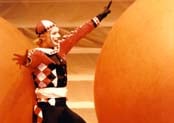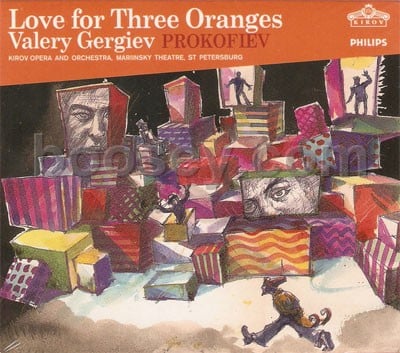OPERA SEARCH

The Love for Three Oranges
(1919)Libretto by the composer, from Vsevolod Meyerhold's adaptation of a play by Carlo Gozzi (F,R,G,E). Original French version by Vera Janacópulos and the composer.
Major roles: S,A,2T,2Bar,2B
minor roles: 2M,S,A,T,3B; chorus; ballet
2.picc.2.corA.3(II=Ebcl,III=bcl).3(III=dbn)-6.3.3.1-timp.perc:BD/cyms/tgl/t.mil/tam-t/chimes/xyl-2harp-strings;
Reduced orchestration by Philipp Haag (2020): 2(II=picc).2(II=corA).2(II=Ebcl,bcl).2(II=dbn)-4.2.3.1-timp.perc(2):I=BD/cym/tgl/tam-t; II=glsp/xyl/SD/BD/cym-harp-strings
Abbreviations (PDF)
Boosey & Hawkes
Auditorium Theatre, Chicago, IL
Jacques Coini, director
Conductor: Serge Prokofieff
Company: Civic Opera Company
| THE KING OF CLUBS, ruler of an imaginary kingdom | Bass |
| THE PRINCE, his son | Tenor |
| PRINCESS CLARISSA, niece of the king | Contralto |
| LEANDRO, his prime minister, dressed as the King of Spades | Baritone |
| TRUFFALDINO, jester | Tenor |
| PANTALOON, friend and adviser of the King | Baritone |
| TCHELIO, magician and protector of the King | Bass |
| FATA MORGANA, a witch, protectress of Leandro | Soprano |
| PRINCESS LINETTA | Contralto |
| PRINCESS NICOLETTA | Mezzo Soprano |
| PRINCESS NINETTA | Soprano |
| THE COOK | Bass |
| FARFARELLO, a devil | Bass |
| SMERALDINA, Fata Morgana's black servant | Mezzo Soprano |
| MASTER OF CEREMONIES | Tenor |
| HERALD | Bass |
| TRUMPETER | Bass Trombone |
| Ten Ridiculous People | 5 Tenors/5 Basses |
| Advocates of Tragedy | Chorus of Basses |
| Chorus, Advocates of Lyric Drama | Chorus of Tenors |
| Chorus, Advocates of Farce | Chorus of Altos/Basses |
| Chorus, Little Devils | Chorus of Basses |
| Chorus of Courtiers | SATB |
| Monsters, drunkards, gluttons, guards, servants, 4 soldiers | Silent roles |
Following a debate on theatre, the Eccentrics win and present 'The Love for Three Oranges'. In the royal palace, the prince is ill with hypochondria, and the only cure is to make him laugh. Down in hell, the wicked witch Fata Morgana beats the magician Chelio at a game of cards. Leander, the prime minister, is under Fata Morgana’s protection and plots with Princess Clarissa and the evil Smeraldina to stop the prince from laughing. The jester Truffaldino's ploys to amuse the prince fail, but when he catches sight of Fata Morgana’s knickers, he bursts out laughing. She curses him to fall in love with three oranges and he sets off with Truffaldino to find them. In the desert Chelio tells them that the sorceror Kreonta’s oranges are in his kitchen guarded by a terrifying cook, and gives them a magic ribbon. Truffaldino charms Kreonta’s cook with the ribbon and he and the prince escape with the oranges. Thirsty, Truffaldino opens two of them and discovers two princesses but, as there is no water, both die. Truffaldino flees in remorse. The prince opens the third orange and finds Princess Ninetta, who is provided with water by the Eccentrics. While the prince is away, Fata Morgana captures Ninetta, turns her into a rat and puts Smeraldina in her place. The prince, returning with the King, is horrified at the change in his bride, but is forced to take Smeraldina to the palace. The Eccentrics capture Fata Morgana and send Chelio to save the situation. When the wedding procession arrives, a rat is found sitting on the throne. Chelio turns her back into Ninetta. Fata Morgana and her accomplices flee and the court celebrates the triumph of good over evil.
Prokofieff's encounter in 1916 with the theatre director Vsevolod Meyerhold proved crucial to the genesis of his most popular and in many ways most characteristic opera. Meyerhold's pursuit of an anti-realistic theatre of action using speech rhythms chimed with Prokofieff's operatic experiments in The Gambler, and Meyerhold's adaptation of Gozzi's surrealist and fantasy-filled play inspired the composer to his greatest fusion of magic, comedy and satire. The Love for Three Oranges operates on multiple levels - whether as a play within a play, as a witty critique of operatic tradition, or as a dialectic between historical commedia dell'arte and modern political commentary - and this has attracted many of the world's leading directors and designers to stage the work. Most refreshing of all, however, is the composer's miraculous aural imagination, achieving the near impossible fusion of childlike simplicity and mature sophistication, guaranteeing this opera's continuing universal appeal.
Comic, Romantic

Mikhail Kit/Evgeny Akimov/Larissa Diadkova/Alexander Morozov/Kirov Opera/Valery Gergiev
Philips 462 913-2 (2 CDs)
